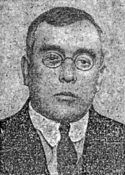
Gurdjieff International Review
NOT A CULT.
Dancing to Develop the Mind
by E. C. Bowyer
Ouspensky, a middle-aged, much-traveled and learned Russian who lives at West Kensington, is the chief missionary for Gurdjieff’s strange academy in the Forest of Fontainebleau which has been described in the Daily News. Among well-known people deeply interested in the school are Mr. Algernon Blackwood, Mr. J. D. Beresford, Mr. A. R. Orage, Mr. J. W. N. Sullivan, Mr. Middleton Murry, Dr. Maurice Nichol, and Lady Rothermere. By his lectures and books, Mr. Ouspensky hopes to attract a number of other distinguished students, but at present he is only attempting to appeal to a very limited circle.
“I don’t like to see the word cult applied to the movement,” he told a Daily News interviewer yesterday, “because that is apt to give an entirely wrong impression. We are not trying to found a church or a sect, but simply to promote a method of education and study. Man, we say, is a much more complicated machine than is generally supposed. Therefore, man must learn to know himself a little better. Little by little he must rediscover those faculties and forces that lie buried in the depths of his nature; and so, by understanding himself, he will at last understand the universe. Gurdjieff and I have reached our present stage of knowledge by long and hard work in many lands. It has been much like what is going on at the present moment in the Valley of the Kings at Luxor.”
“Long ages ago there existed great civilisations and profound knowledge, traditions of which still exist. What remains of the knowledge has often become petrified, so that it is now mere superstition embodied in apparently unmeaning ritual. As at the tomb of Tutankhamen, mountains of rubbish have to be cleared away before the treasure is revealed; but we know now that the treasure is there. As a first step it is necessary to realise that man’s mind has become dulled. You must improve your instrument. The human Faculty of Knowing must be enlarged. That is why ordinary science and art have reached a point at which they can go no further. Progress into the regions beyond involves a perfect harmony of mind and body such as can only be secured by careful training under the right conditions. Hence the institute in the Forest of Fontainebleau, where each action of the body is brought into relation with some desired activity of the mind.”
In this connection Mr. Ouspensky was particularly anxious to make it clear that the hard manual labour described in the articles by a Daily News Special Correspondent has nothing to do with a Tolstoyan love of work for work’s sake. It has to be infinitely associated at the Fontainebleau Institute with certain ideas and is merely one—often a brief—stage in the education of the student. In the same way, the dancing which forms an important part of the curriculum is intended to develop particular mental faculties, each dance being an exercise associated with a mental problem. According to Gurdjieff and Ouspensky, the dances of the Dervishes, which they have closely studied on the spot, are of this nature, though the Dervishes themselves have lost almost all knowledge of their true significance.
Before meeting Gurdjieff at Moscow in 1915, Mr. Ouspensky had made a special study of the psychology of art during travels in Central Asia, Egypt, and India, and had also specialised in certain branches of higher mathematics. In Gurdjieff he found a kindred spirit who had gone farther on the same road, and the two enthusiasts joined forces, traveling and teaching in Russia as they were driven hither and thither by the tide of war or famine. After some years of this wandering life they found themselves in Constantinople, and from there drifted across Europe till they pitched their camp in the famous forest near Paris. “My book, telling of our discoveries so far as they have gone, should be out this summer,” Mr. Ouspensky stated. “I am thinking of calling it Fragments of an Ancient Teaching. In the meantime I am lecturing before small private classes, which is as much as my command of English permits.”
“When students have once got over the initial difficulty of thinking along new lines and grasping the meaning of the terms employed—which may sometimes take a good many weeks—they make steady progress in quickness of perception and understanding, even without taking a course at the Institute. The difficulty on our side is to translate our discoveries into modern forms, but I hope that there, too, progress is being made.”
|
Copyright © 1923 The Daily News This webpage © 1999 Gurdjieff Electronic Publishing Featured: Winter 1998/1999 Issue, Vol. II (2) Revision: January 1, 2000 |